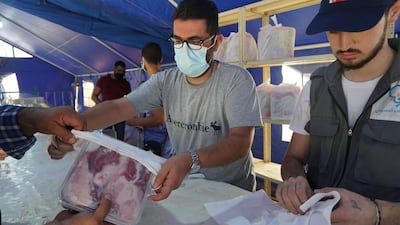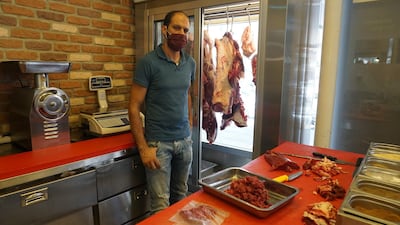For Muslims across the world, Eid Al Adha festivities are synonymous with a lavish meal of home-cooked mutton.
But this year, many Lebanese will have to forgo meat altogether. Prices have soared in the past months and their purchasing power has plummeted.
“Eid? There is no Eid this year,” said the lone client at a butcher shop in Saida, in the south of the country. “I used to buy seven or eight kilos of meat that would last me two weeks. Now, I buy the same amount for one month.”
The price of mutton has more than quadrupled, from 7,000 Lebanese pounds a kilo to 33,000 Lebanese pounds, said the shop's owner, Muhammad Al Jamal.
As hyperinflation hits the country, basic goods have become unaffordable.
The local currency has crashed in a country that imports nearly everything it consumes. Meat, like baby milk or spare car parts, must be bought with dollars purchased on the black market, driving up prices. But salaries have not changed.
A sheep to slaughter for Eid now costs more than twice the monthly minimum wage, or 1.6 million Lebanese pounds.
“I have lost 70 per cent of my customers,” said Mr Al Jamal, who pulled out his mobile phone to show a video of an empty slaughterhouse in Saida shot one month ago. “Around 15 sheep and 40 cows would be slaughtered there a day. Look, there is nothing now,” he said.
To limit the spread of Covid-19, authorities implemented a five-day shutdown during Eid Al Adha, compounding the general feeling of hopelessness. “We will stay at home like poor people,” said Mr Al Jamal’s client, a father of two.
Half an hour south of Saida, in the city of Nabatieh, hundreds of people queued for free mutton and rice on Thursday.
“The last time I ate meat was five months ago,” said one woman, who declined to give her name, as she left with two kilos of mutton that she said she would freeze and cook in small portions to last her an entire month. “I can’t afford it, even at half price.”
_______________
Eid Al Adha around the world
_______________
During the last Ramadan, a local NGO, Nabatieh First Aid, set up a tent in the city centre for people to buy half-price meat and vegetables every Sunday.
Volunteers selected 320 local families with an income lower than 350,000 Lebanese pounds a month to benefit from the discounted market which continued to operate after Ramadan. Goods were given away for free for Eid Al Adha.
“We help as much as we can, but of course, the need is greater than our capacities,” said Mahdi Sadek, a volunteer at Nabatieh First Aid, which is supported by private donations and is not politically affiliated. At the tent’s entrance, a desperate man waited, hoping that someone would give him medicine for his diabetic son even though the NGO distributes only food.
Salma Salloum, a 50-year-old pharmacy employee, told The National she could barely make ends meet for her family of three with her monthly salary of 700,000 Lebanese pounds. "I stopped buying meat from butchers when prices started going up," she said. "My salary is not enough to pay for electricity, water, and the private generator."
To have electricity round the clock, Lebanese households must subscribe to a private neighbourhood generator. Their charges have doubled recently because of a diesel shortage. Daily power cuts were the norm before the crisis, but they have increased to more than 20 hours a day.
“This is the first year that I cannot buy meat. Before, our salaries were sufficient. The dollar was at 1,500,” said Ali Chahrour, an employee at a local mosque, referring to the pound’s official peg to the American currency. For 22 years, it allowed the Lebanese to enjoy strong purchasing power. The remains in place officially but is rarely used in everyday life.
“Unfortunately, our officials stole from us,” Mr Chahrour said, echoing an oft-heard criticism of the Lebanon’s politicians. Although the economic situation is worsening by the day, the government has been unable to implement anti-corruption reforms that are demanded by the International Monetary Fund in exchange for a bailout.
“If they stay in power, our situation will worsen,” said Mr Chahrour. “We need reforms.”
Last October, hundreds of thousands of Lebanese took to the streets as the first cracks in the country’s economic model started to appear. For the first time, people of all religions hurled insults at the ruling political class, which has been in power for decades.
But the movement only lasted a few months. Most Shiite Muslims, who constitute roughly one third of Lebanon's population, quit protesting after a few weeks. The two parties that represent their community, Hezbollah and its ally Amal, criticised protesters. Some were offended by what they perceived as lack of respect for their leaders.
In some cities, including Nabatieh, an Amal stronghold, protesters were beaten. Activists accused supporters of the party, which did not comment on the incidents.
“I protested at the beginning, but then there were insults, and I stopped,” said Mr Chahrour. “A revolution should not be like that. It should be civilised.”






















